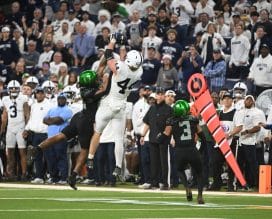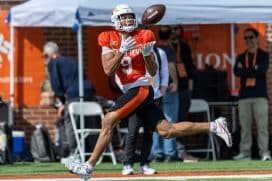Phillies
Ed Bolden and Black Baseball in Philadelphia
By Matt Albertson, Historical Columnist
In February I wrote an article about Satchel Paige pitching in the Phillies farm system for three years in the late 1950's, one step away from the mound at Connie Mack Stadium. Paige had his moments in the majors on several occasions in the years immediately after Jackie Robinson broke the color barrier in 1947, allowing other negro leaguers to sign minor and major league contracts. This spelled the beginning of the end for the proud negro leagues. Many negro leaguers eventually played in the majors or in major league farm systems, but others, whether due to racism, insufficient talent, old age or otherwise, never got their moment to shine on the sport's biggest stage.
Philadelphia baseball fans know that the Phillies have infamously lost more games than any other professional sports franchise in the world. Some of these fans are aware that the Athletics once called Philadelphia home and won five championships during their half-century tenure in the city. Fewer are aware that the city was also home to two championship caliber baseball teams in the first half of the 20th century, the Hilldale Daisies and Philadelphia Stars. Both clubs owed their success and prominence to owner and marketing extraordinaire Ed Bolden.
At Sports Talk Philly, we strive to provide the best Philadelphia based sports content available. It is with great pleasure that I announce that over the next week we will publish, with permission, a book excerpt from Dr. Courtney Smith's recent book, Ed Bolden and Black Baseball in Phildelphia. Dr. Smith is an Associate Professor of History and Political Science at Cabrini University and has presented her research at regional and national conferences, including the Annual Meeting of the Society for American Baseball Research and the Annual Meeting of the Pennsylvania Historical Association. Additionally, she serves as the Managing Editor for the peer-reviewed Black Ball: A Journal of the Negro Leagues. Without further adieu, I present the first portion in this series which will eventually comprise all of Chapter 3.
♦ ♦ ♦
Chapter 3
The Fall: Ed Bolden and Hilldale 1925-1930
Over the first fifteen years of his career in black professional baseball, Bolden established himself as the next in a long line of African American leaders in the Philadelphia area. He led Hilldale on a steady progression from a sandlot team to a World Series champion. Additionally, Bolden asserted leadership within the larger world of black professional baseball. He spearheaded the formation of an African-American corporation to support Hilldale. He also established a league, the Eastern Colored League (ECL), that brought together top eastern black professional baseball teams and that mirrored a similar organization Andrew Rube Foster established in the Midwest. Though all owners shared governance powers within the ECL, Bolden served as the league’s first chairman and represented the ECL’s public voice in the Philadelphia Tribune and other black newspapers. In the ECL’s first three seasons, Hilldale reigned as the league’s dominant team, winning three pennants on its way to its World Series victory over the Kansas City Monarchs in 1925.
Starting in 1925 and accelerating over the next four years, Bolden faced dissent and criticism that steadily undermined his leadership and standing within black professional baseball. Most of the criticism that Bolden faced stemmed from his tendency to use white umpires, instead of black umpires, in both regular season and postseason games. Even though Bolden led an African American corporation, some people within black professional baseball and in the black press regarded his use of white umpires as a betrayal. As Bolden endured the dissent and criticism, Hilldale’s standing within the ECL dropped, and the team faced financial difficulties. The combined problems took a personal toll on Bolden, and he suffered a nervous breakdown in September 1927. Bolden’s breakdown temporarily took him away from black professional baseball. Once Bolden returned, he pursued aggressive actions designed to protect Hilldale at any cost. His actions precipitated the demise of two leagues, the ECL and the short-lived American Negro League (ANL). He also faced mounting criticism for his continued use of white umpires and his association with white businessmen.[i]
Bolden’s seemingly heartless and cutthroat actions stemmed from an increasingly dire situation facing Hilldale and other black teams. An economic downturn hit African Americans in Philadelphia and other major cities several years before the Stock Market Crash grabbed newspaper headlines. The downturn hurt already-vulnerable African Americans and weakened, or even eliminated, their ability to patronize teams like Hilldale. Though Bolden earned high marks at his full-time Post Office job, his annual salary stood at only $1900. Similarly, many people within Philadelphia’s growing African American population found employment in modest-paying or low-paying jobs. The economic downturn both limited the number of jobs available to African Americans and limited their buying power of their annual salaries. Such a situation meant that Bolden had to fight for every dollar from African American baseball fans in the Philadelphia region. It also meant that Bolden explored another option for maintaining Hilldale’s operations—a partnership with a white businessman.[ii]
For Bolden, the year 1930 marked his ugliest year in his black professional baseball career. His experiences during that year reflected the limits and the effectiveness of the self-help philosophy that had guided him since he had established the Hilldale Corporation. Garvey’s Pan-Africanist movement floundered in the late 1920s as Garvey faced deportation from the United States and his business ventures faltered. Similarly, Bolden’s determination to lead a black enterprise and to foster a black corporation floundered as economic conditions among his base of supporters diminished. His determination to uphold high standards, combined with a personal health crisis, unearthed a streak of ruthlessness in his actions. His willingness to turn to white capital as a means of support triggered a fierce response from other members of the corporation and black sportswriters. That fierce response demonstrated the sense of pride that Hilldale instilled and the persistence of the hope that black capital could support black enterprises. That fierce response also drove Bolden from black professional baseball and, for a time, seemed to close the door on his career.[iii]
Race and Umpires
Umpire-related issues bedeviled Bolden and other baseball owners for many years. Unlike the arrangement in Major League Baseball, ECL and NNL teams selected their own umpires for their home games. As a result, confrontations between players and umpires and allegations of umpire bias marred many games. Prior to the start of the 1924 season, Bolden and other ECL owners felt compelled to adopt new regulations for on-field conduct. The new regulations designated the field captain or playing manager as the only people eligible to resolve on-field controversies or deliver protests against umpires’ calls. The new regulations also prohibited players from engaging in umpire baiting. Players faced ejection and fines for baiting umpires; they faced a fine of $100 for assaulting umpires. Bolden and the other owners also imposed some regulations upon umpires because they believed that “the appearance of [the] umpires and their efficient service have a tendency to upbuild organized baseball.”[i] For the umpires, the new regulations called upon them to arbitrate unbiased games, use discretion when removing players from games, and to act promptly when ejecting players. Umpires faced expulsion for failing to adhere to the vague guidelines.[ii]
The 1924 World Series between the Kansas City Monarchs and Hilldale sparked some renewed discussion about the use of black umpires. Prior to the World Series, a National Commission composed of Bolden, Foster, and other representatives from the ECL and NNL made arrangements for the series. As part of those arrangements, the representatives chose white umpires to work at all of the games. The use of white umpires drew some mild criticism from writers in the Pittsburgh Courier. One writer lamented that the use of white umpires contradicted the overall spirit of the series and represented an insult to the black umpires whom both leagues had used during the season. The writer, however, reasoned that the leagues used the umpires in order to avoid any claims of bias toward Hilldale or Kansas City.[iii] A few weeks later, the Courier’s W. Rollo Wilson mentioned black umpires in his regular column. Wilson used his column to “respectfully invite the [ECL’s] attention to the proposition advanced by us some time since—NEGRO umpires, paid by the league, rotated among the cities of the league.”[iv] As Wilson reasoned, if “colored men can play baseball they can umpire baseball games and should be given the chance to do so.”[v]
The twin issues of race and umpiring blossomed again during the 1925 season. For the first time, the ECL decided to use a rotating crew of umpires, and it hired a white man, Bill Dallas from the Evening Ledger, as the crew’s leader.[vi] In response, Tribune sports editor J.M. Howe drew a cartoon depicting the ECL as an Uncle Tom character. Speaking for the ECL, Bolden wrote a letter strongly objecting to the cartoon and defending Dallas’ hire. Bolden decried the cartoon as “untimely and unfair,” particularly since the ECL’s decision to hire Dallas reflected its desire to provide teams with “a system of competent umpiring.”[vii] Bolden praised Dallas as conscientious, capable of making decisions regardless of a player’s race, and more experienced than other umpires in the ECL. The ECL, therefore, made a logical and sound decision to make Dallas the leader of its umpiring crew.[viii]
Even with the rotating crew of umpires, controversy and conflicts continued to mar many ECL games, and similar incidents engulfed the NNL. In the middle of the season, two NNL umpires wrote a letter to the Pittsburgh Courier’s Rollo Wilson. The umpires asked for patience and understanding for their fellow umpires who occasionally made mistakes. They also chastised the newspaper for publishing managers’ and owners’ complaints, which they regarded as propaganda for the league, and asked for more balanced coverage.[ix] One month after their letter appeared in the Courier, Rube Foster announced that he had released most of the NNL’s umpires. One of the released umpires, Bert Gholston, had co-written the letter published in the Courier. When he announced his decision, Foster used the opportunity to criticize the “wretched” umpires whose work “had been anything up to the standard.”[x] He detailed the umpires’ shortcomings—bad decisions that led to on-field disruptions, lack of knowledge about baseball’s rules, and not using the correct hands to call balls and strikes.[xi] Shortly after Foster unleashed his rant against the NNL’s umpires, an ECL game between Hilldale and Harrisburg featured fights both on the field and in the stands. The game prompted Wilson to lament about the normality of rowdy baseball in the ECL and about the poor state of umpires in the league. He noted that one of the umpires at the Hilldale-Harrisburg game called time to get a drink of water; the pause seemed to help Hilldale’s pitcher. The umpire also refrained from punishing a player who threw dirt at him to protest a call. Wilson cautioned that such actions threatened the ECL’s integrity and had the potential to drive fans away from ECL games.[xii]
As the 1925 season reached its conclusion, concerns and anger involving umpires remained potent. After his release, Gholston blamed race as the key factor in the on-going conflicts between teams and umpires. He accused several NNL teams of planning to physically attack black umpires and of refusing to respect black umpires’ decisions. He also claimed that the lack of respect for black umpires touched the entire league and not simply a few teams.[xiii] Wilson again devoted space in another one of his regular columns to the umpire situation, boldly proclaiming that “EASTERN LEAGUE UMPIRES HAVE NO MORE AUTHORITY THAN A KU KLUXER WOULD HAVE AT A BANQUET OF THE ‘HELL FIGHTERS’ IN HARLEM!”[xiv] He provided some details on more evidence of biased umpires in recent ECL games and disavowed the rotating umpire system, a system he once advocated. Though Wilson focused his ire at the “bimboes” who worked as umpires, he placed some of the blame upon the ECL and the umpire supervisor Dallas.[xv] He reasoned that the lack of support they provide to competent umpires compel those umpires to favor the home teams and, therefore, exacerbate grievances against all umpires.[xvi]
Wilson’s diatribe foreshadowed reactions from black sportswriters concerning the ways Bolden conducted his business. For Wilson, the treatment accorded black umpires likely rankled him because it played into ugly stereotypes concerning African Americans. If black umpires could not effectively assert their authority over black players, then Bolden and other officials had no choice but to use white umpires. The image of white umpires restoring order over black players within a black league could lead to suggestions that African Americans could not govern their own affairs. The use of white umpires, furthermore, could lead to broader suggestions that black men could not occupy positions of authority and that segregation statutes maintained a proper sense of order in American society.
Umpire-related controversies plagued Bolden and the ECL again in 1926 particularly since the owners discontinued the use of a rotating umpire system. Instead, the league reinstated the policy of allowing home teams to hire umpires. Consequently, visiting teams frequently complained about biased calls, and players engaged in altercations with umpires. In one altercation, Hilldale’s Phil Cockrell punched an umpire after the umpire changed his mind on a call. According to the accompanying story in the Tribune, the fight brought local cops out onto the field, and one of the cops hit Cockrell in the back of his head as he left the diamond. Bolden tried to assert leadership on the issue by fining Cockrell $100 and suspending him for five days. Through his actions, Bolden probably intended to make an example out of Cockrell and to discourage other players from attacking umpires. Bolden actions, however, seemed like a desperate attempt to assert his authority over and bring order to an increasingly unruly ECL. Criticism surrounding umpires represented only one of several serious problems plaguing Bolden and the rest of the ECL. The other problems targeted Bolden’s leadership and deeper questions about the way black baseball should operate in American society.[xvii]
♦ ♦ ♦
[i] “Status of Umpires Discussed at Meet of Commissioners,” Philadelphia Tribune 19 April 1924.
[ii] Ibid.
[iii] “Final Arrangements and Complete Details Are Made for East-West Baseball Classic,” Pittsburgh Courier 20 September 1924; “The Sportive Realm,” Ibid. 1 November 1924.
[iv] W. Rollo Wilson, “Eastern Snapshots,” Ibid. 22 November 1924.
[v] Ibid.
[vi] “White Newspaperman is Picked by Eastern League as Supervisor of Umpires,” Ibid. 28 March 1925.
[vii] “Hilldale Manager Takes Exception to Howe Cartoon,” Philadelphia Tribune 4 April 1925.
[viii] Ibid.
[ix] “Comes to Bat in Behalf of Umpires,” Pittsburgh Courier 18 July 1925.
[x] “Foster Explains Action in Releasing Umpires,” Chicago Defender 22 August 1925.
[xi] Ibid.
[xii] J.M. Howe, “Sport Sidelights,” Philadelphia Tribune 1 August 1925; Wilson, “Eastern Snapshots,” Pittsburgh Courier 1 August 1925.
[xiii] “Umpires Not Given Support Says Gholston,” Philadelphia Tribune 5 September 1925.
[xiv] Wilson, “Eastern Snapshots,” Pittsburgh Courier 12 September 1925.
[xv] Ibid.
[xvi] Ibid.
[xvii] “Near Riot at Shore When Cops Beat Cockrell; Bacharachs Win Game 1-0,” Philadelphia Tribune 14 August 1926; “Diamond Dust,” Ibid.; William G. Nunn, “Diamond Dope,” Pittsburgh Courier 14 August 1926; Wilson, “Eastern Snapshots,” Ibid. 21 August 1926.
[i] “White Newspaperman is Picked by Eastern League as Supervisor of Umpires,” Pittsburgh Courier, 28 March 1925; “Hilldale Manager Takes Exception to Howe Cartoon,” Philadelphia Tribune 4 April 1925.
[ii] Lanctot, 142-205.
[iii] Judith Stein, The World of Marcus Garvey: Race and Class in Modern Society (Baton Rouge: Louisiana State University Press), 248-273.





